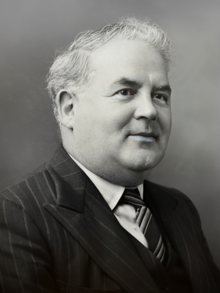William Norton
William Norton | |
|---|---|
 Norton, c. 1940s | |
| Tánaiste | |
| In office 2 June 1954 – 20 March 1957 | |
| Taoiseach | John A. Costello |
| Preceded by | Seán Lemass |
| Succeeded by | Seán Lemass |
| In office 18 February 1948 – 13 June 1951 | |
| Taoiseach | John A. Costello |
| Preceded by | Seán Lemass |
| Succeeded by | Seán Lemass |
| Leader of the Labour Party | |
| In office 19 July 1932 – 2 March 1960 | |
| Preceded by | Thomas J. O'Connell |
| Succeeded by | Brendan Corish |
| Minister for Social Welfare | |
| In office 18 February 1948 – 13 June 1951 | |
| Taoiseach | John A. Costello |
| Preceded by | Seán Lemass |
| Succeeded by | Seán Lemass |
| Minister for Industry and Commerce | |
| In office 2 June 1954 – 20 March 1957 | |
| Taoiseach | John A. Costello |
| Preceded by | Seán Lemass |
| Succeeded by | Seán Lemass |
| Teachta Dála | |
| In office February 1948 – 4 December 1963 | |
| Constituency | Kildare |
| In office February 1937 – February 1948 | |
| Constituency | Carlow–Kildare |
| In office February 1932 – July 1937 | |
| Constituency | Kildare |
| In office February 1926 – June 1927 | |
| Constituency | Dublin County |
| Personal details | |
| Born | 2 November 1900 Abbotstown, Dublin, Ireland |
| Died | 4 December 1963 (aged 63) Dublin, Ireland |
| Political party | Labour Party |
| Spouse | Helen MacNamee (m. 1922) |
| Children | 5, including Patrick |
William Joseph Norton (2 November 1900 – 4 December 1963) was an Irish Labour Party politician who served as Tánaiste from 1948 to 1951 and from 1954 to 1957, Leader of the Labour Party from 1932 to 1960, Minister for Social Welfare from 1948 to 1951 and Minister for Industry and Commerce from 1954 to 1957. He was a Teachta Dála (TD) from 1926 to 1927 and from 1932 to 1961.[1]
Norton was born in Dublin in 1900.[2] He joined the postal service in 1916. By 1920, he was a prominent member of the Irish Postal Union and the wider trade union movement in Ireland. From 1924 to 1957, he served as Secretary of the Post Office Workers' Union.[3]

He was elected as a Labour Party TD for Dublin County at a by-election in 1926, but was defeated at the June 1927 general election. On constitutional matters, Norton opposed the introduction into force of the Executive Authority (External Relations) Act 1936 which continued a role for the British King after the King was removed from the Constitution of Ireland. In Norton’s view, the association with the British King should have ended when Edward VIII “voluntarily relinquished his objectionable role here”.[4]
In Professor Tom Garvin's review of the 1950s 'News from a New Republic', he comes in for praise as a moderniser. Garvin places him with a cross party group including Gerard Sweetman and Daniel Morrissey of Fine Gael as well as Seán Lemass of Fianna Fáil who were pushing a modernising agenda. He represented Kildare from 1932 until his death in 1963.[5]
In 1932, he became leader of the Labour Party. In the First Inter-Party Government from 1948 to 1951, Norton became Tánaiste and Minister for Social Welfare. In the Second Inter-Party Government from 1954 to 1957, Norton served as Tánaiste and Minister for Industry and Commerce.
William Norton died in Dublin in 1963. His son Patrick Norton served as a TD for Kildare from 1965 to 1969.
See also
[edit]References
[edit]- ^ "William Norton". ElectionsIreland.org. Archived from the original on 31 December 2017. Retrieved 28 September 2008.
- ^ White, Lawrence William. "Norton, William Joseph". Dictionary of Irish Biography. Retrieved 30 April 2022.
- ^ Smethurst, John B.; Carter, Peter (June 2009). Historical Directory of Trade Unions. Vol. 6. Farnham: Ashgate Publishing. p. 374. ISBN 9780754666837. LCCN 80-151653.
- ^ Nicholas Mansergh, ‘Survey of the British Commonwealth’, pg. 274
- ^ "William Norton". Oireachtas Members Database. Archived from the original on 7 November 2018. Retrieved 28 September 2008.


 French
French Deutsch
Deutsch